Most scam victims willingly send money to scammers, here’s how S’pore’s govt aims to fix this
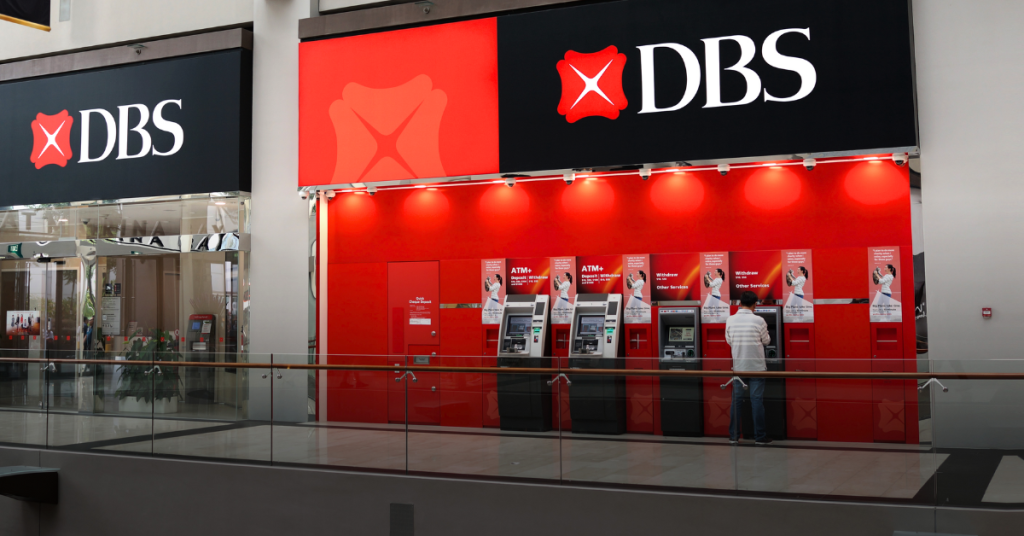
Singapore has plans to introduce a new law called the Protection from Scams bill in the coming months, according to a statement from the Ministry of Home Affairs on August 30.
As the name suggests, the proposed law aims to fight scams in the country. How? By letting the police freeze bank accounts and credit cards without warning if they believe someone is being targeted by scammers.
Specifically, the police will be able to issue Restriction Orders (ROs) to banks, which then enables them to temporarily restrict banking transactions of individuals targeted by ongoing scams who continue to transfer money despite warnings.
If an individual has been assessed to warrant a RO, the police will issue the RO to all the seven Domestic Systematically Important Banks (D-SIBs) in Singapore. This is in cases where the individual has banking accounts with more than one bank.
This bill is a response to the rise in scam cases, where victims transfer money to fraudsters despite safeguards like the current “kill switch”.
A shocking 86% of scams reported in early 2024 were “the result of self-effected transfers”. Basically, they involved victims willingly sending money to scammers.
The law will target scams done remotely, such as via phone, text, or online. Accounts could be frozen for 28 days, or even longer if needed.
But don’t worry—those affected can still ask the police for money to pay bills and essential expenses. Plus, if you think the freeze is unfair, you can appeal to the Ministry of Home Affairs.
Feedback welcomed
While the intentions of the bill are clear and positive, the introduction of the law could lead to differing public opinions. While some may understand and welcome it as a necessary tool to prevent scams, some may see it as a form of government overreach.
However, the MHA emphasised that the ROs will only be issued as a last resort, after other efforts to convince scam targets to stop the transfers have failed.
On another note, the bill could potentially affect people’s trust in banks, as they may feel uneasy about the notion that their funds could be frozen without notice. They may turn to decentralised solutions such as cryptocurrencies, which may end up resulting in fraud too.
From now until the end of September, the ministry is seeking public feedback on the new bill. How Singapore decides to move forward with this proposed bill may set the stage globally for similar safeguards against scams.
Also Read: 15 yrs of witnessing telco inefficiencies drove this duo to bootstrap RM100K to modernise it
Featured Image Credit: DBS Bank
45% of M’sians consider themselves a minority at work, with Gen Zers most likely to think so
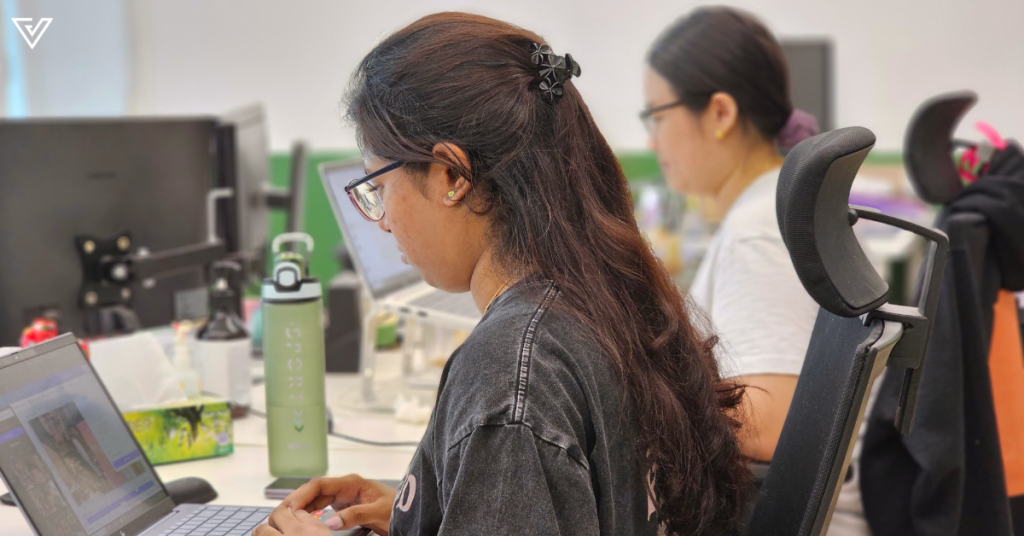
45% of respondents in a recent Randstad survey consider themselves a minority at work in Malaysia because of various reasons such as ethnicity, nationality, religion, and disability.
That means nearly one in two Malaysian respondents believe they are a minority.
This statistic is reported in Randstad’s ninth annual Employer Brand Research in Malaysia. Conducted in January 2024 by Kantar TNS, the study surveyed over 173,000 respondents worldwide, which included 2,500 individuals in Malaysia.
According to a September 4 press release, this makes the report the world’s most comprehensive employer branding research based on general talent perceptions.
Randstad is a global talent company, armed with a vision to be the world’s most equitable and specialised talent company.
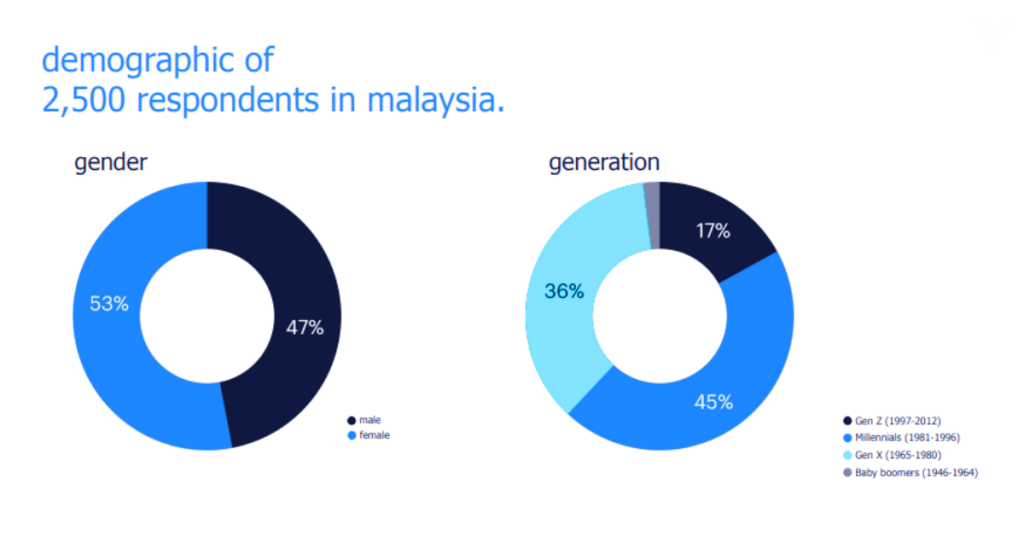
Fahad Naeem, Country Director at Randstad Malaysia said, “Despite significant progress towards greater diversity, our research reveals a gap in true inclusivity in Malaysia’s working population.”
Fahad added that equity is a must-have in human resources strategies, especially when the objective is to attract and retain talent for their skills and experience.
“An equitable workforce pays for itself when everyone respects each other’s differences and finds ways to collaborate to achieve the same goal,” he said.
Gen Zers are more likely to feel like minorities
In the survey, 56% of Gen Zers and 47% of Millennials reported feeling like minorities in their workplaces.
Meanwhile, 41% of Gen Xers feel the same.
A significant factor contributing to these feelings is how their ethnicities, nationalities, and race are perceived by their colleagues and employers.
Specifically, 19% of Gen Zers cited their religious beliefs as a reason for feeling like minorities, while only 12% of Millennials and 9% of Gen Xers shared this concern.
Younger generations being more likely to identify as minorities could be attributed to higher modern societal awareness.
Gen Xers feel most overlooked by employers
While Gen Xers were less likely to feel like a minority compared to younger Gen Z and Millenial employees, one in five Gen Xers surveyed did not feel that the best opportunities go to the most deserving employees in their careers.
Gen Xers are also the least likely to think that their employers provide equal pay for equal work.
Two in three (66%) Baby Boomers said that their senior managers are fair when it comes to providing re-skilling and upskilling opportunities, as opposed to 52% of Gen Zers and Gen Xers.
Gender inequality continues to persist in male-dominated industries
On the national level, the differences between how the two different genders view their employers are marginal.
However, the research reveals wider gaps in the male-dominated industries, specifically the technology industry.
In the technology industry, 31% of women believe that they are not receiving equal pay for equal work, while only 18% of men share this view.
Additionally, in the technology sector, 23% of women do not believe that the best opportunities go to the most deserving employees in their organisation, while only 12% of men hold the same belief.
How does feeling like a minority affect a person in the workplace?
Of the respondents who identify as minorities at work, 60% of them reportedly faced career obstacles, 26% higher than those who do not identify as minorities.
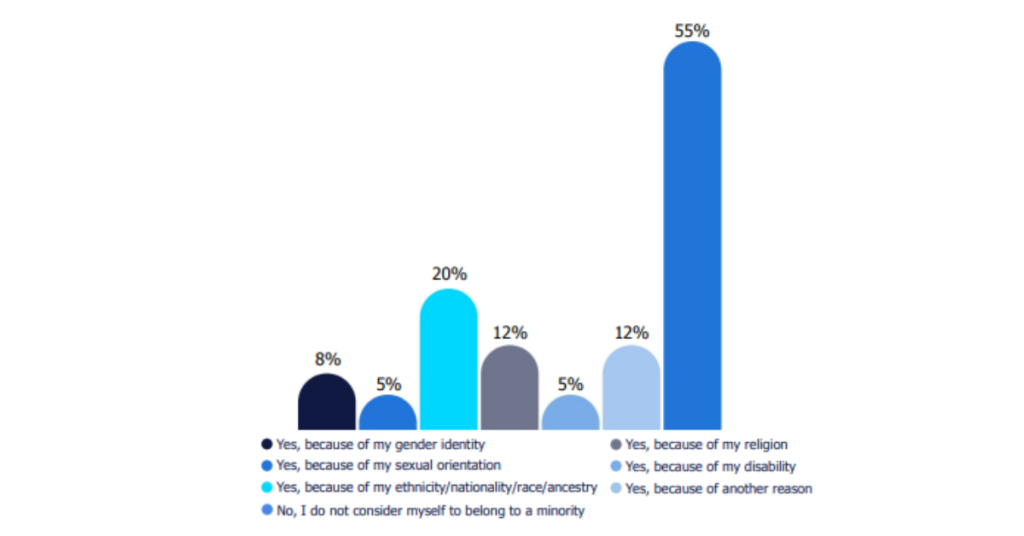
That means even though 44% of all respondents faced career growth obstacles, minorities are 26% more likely to have it worse.
Obstacles could include unclear promotion processes, unconscious bias, and limited access to mentorship or training.
Naeem shared, “To bridge this gap, employers can be more transparent about the metrics and methods they use to evaluate and assess their employees. Through open communication, employers will be able to have more constructive dialogues to improve their assessments.”
Addressing these challenges will unlock their diverse workforce’s full potential, leading to a more engaged, innovative, and talent-rich workplace.
Also Read: 15 yrs of witnessing telco inefficiencies drove this duo to bootstrap RM100K to modernise it
After The Hungry Tapir’s success in KL, this family is now creating a vegan F&B empire
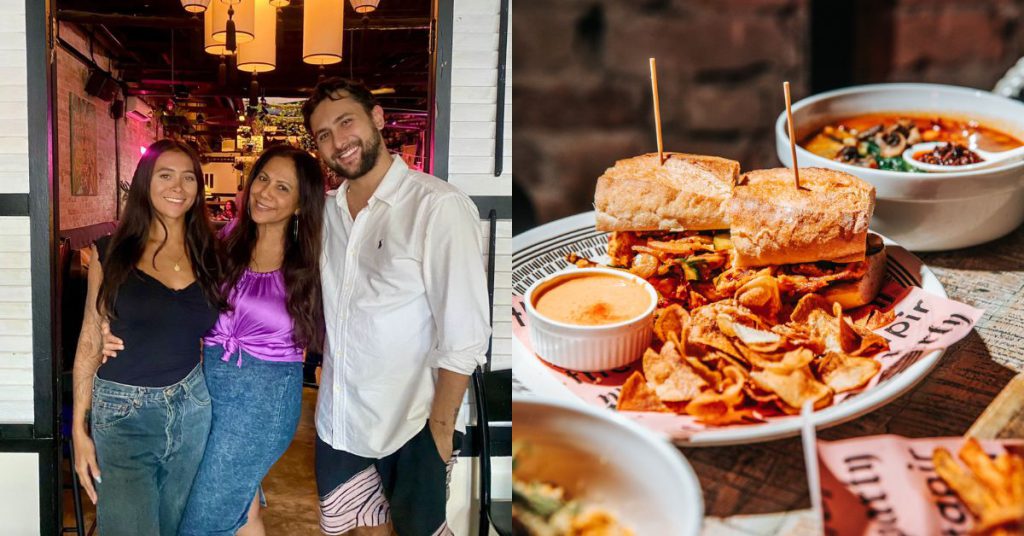
The rise of vegan eateries in Kuala Lumpur is a trend that’s hard to miss. Among these culinary pioneers is The Hungry Tapir, a restaurant nestled in the bustling streets of Chinatown.
Helmed by a family deeply embedded in the creative industry, The Hungry Tapir brings together design, music, and a love for vegan cuisine, making it a standout spot in KL’s food scene.
The journey began in 2018 when Makissa, a former graphic design student, returned from London to Kuala Lumpur. With a background in digital marketing and experience working with startups like Rage Coffee, she was well-equipped to take on new challenges.
When Rage Coffee closed during the pandemic, she focused full-time on building The Hungry Tapir with her family.
“My background in design and marketing, my mum’s love for interior design, and my brother’s passion for music all came together. We were all involved in the creative industry, and it made sense to channel that creativity into a business we were all passionate about—food,” Makissa told Vulcan Post.
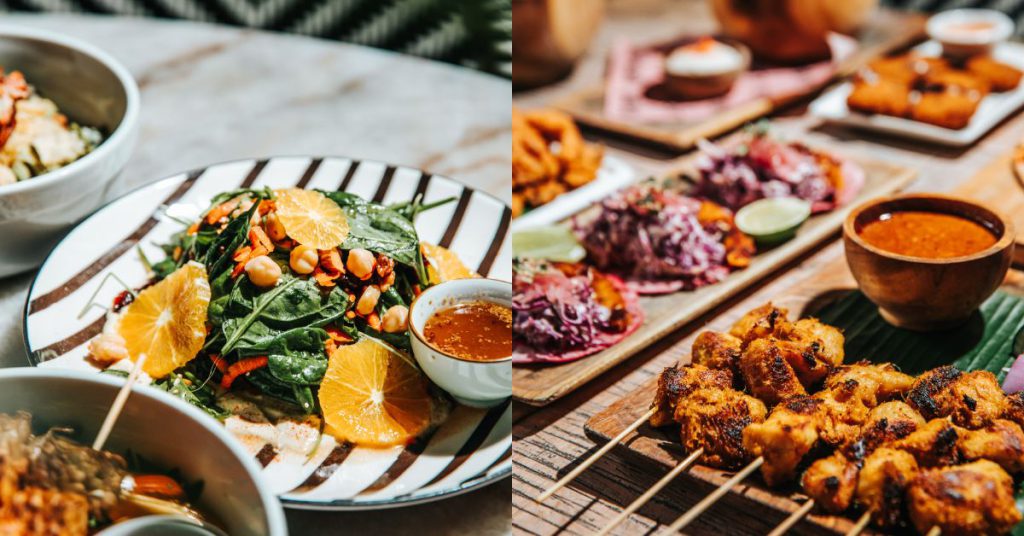
From pipe dream to reality
The family had always harboured dreams of opening a restaurant, but life and other commitments kept those dreams on the back burner.
The gentrification of Chinatown in 2019 brought new opportunities as more spaces became available for rent, spurred by the development of new establishments like the Four Points Hotel. This change in the landscape prompted the family to take a leap of faith.
“We didn’t do any pop-ups or test runs. It was the blind leading the blind,” the founder recalled with a laugh. “But once we found the space, we were all in. We envisioned a vegan, plant-based restaurant with a bar—something unique to KL’s culinary scene.”
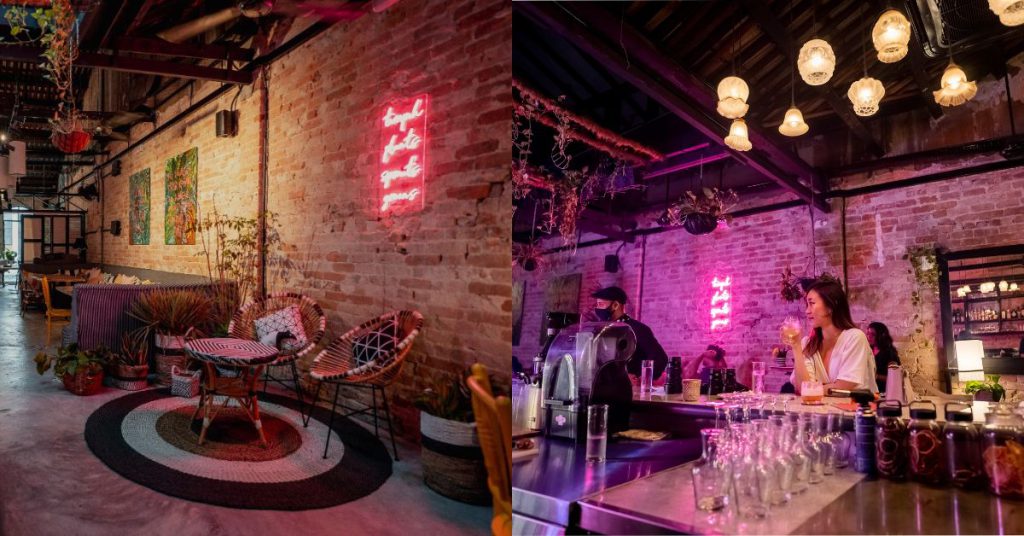
“My mum was the one who first noticed these spaces in Chinatown. We looked at a few spots before settling on the one we have now. When we found it, we just knew. It was the perfect place to bring our dream to life.”
With a location secured, they quickly set about planning. They meticulously crafted everything, from the interiors to the branding and even the menu, albeit in a somewhat unconventional manner.
The family didn’t follow a traditional business model—they put their passions first, and the details fell into place as they went along. They completed the entire process, from signing the lease to opening their doors, in just two months.
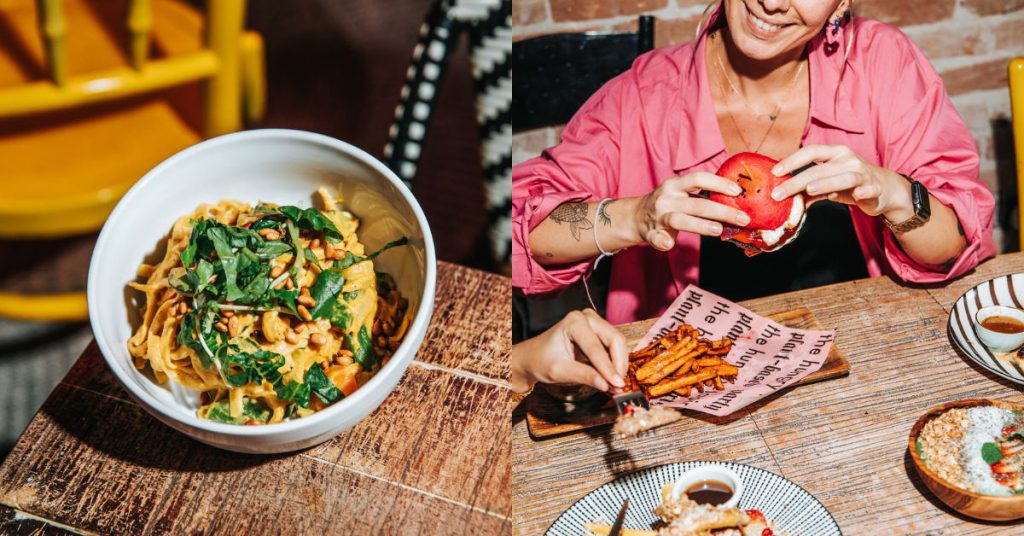
“We winged it a lot. We didn’t have a full menu at first, just a few sharing dishes. It was all about trial and error, but looking back, it was as organic as it could have been. We learnt so much on the way.”
Growing pains and triumphs
Opening a restaurant in an old heritage building comes with its own set of challenges, and The Hungry Tapir was no exception.

Their first soft launch was fraught with issues, including a complete power outage on their street. They prepped by torchlight and cooked their debut buffet without electricity. Yet, these initial hurdles didn’t deter them. They pushed through, hosting a lively opening with Sabahan tuak shots and an all-you-can-eat vegan buffet.
“If there’s one thing we’ve learnt, it’s that Chinatown has its charms—and challenges. Our building is beautiful, but it requires a lot of maintenance. Even now, we’re constantly dealing with issues like leaks and power cuts.”
Just when they thought they had seen it all, COVID-19 hit. With barely two months of operation under their belt, The Hungry Tapir faced an unprecedented crisis.
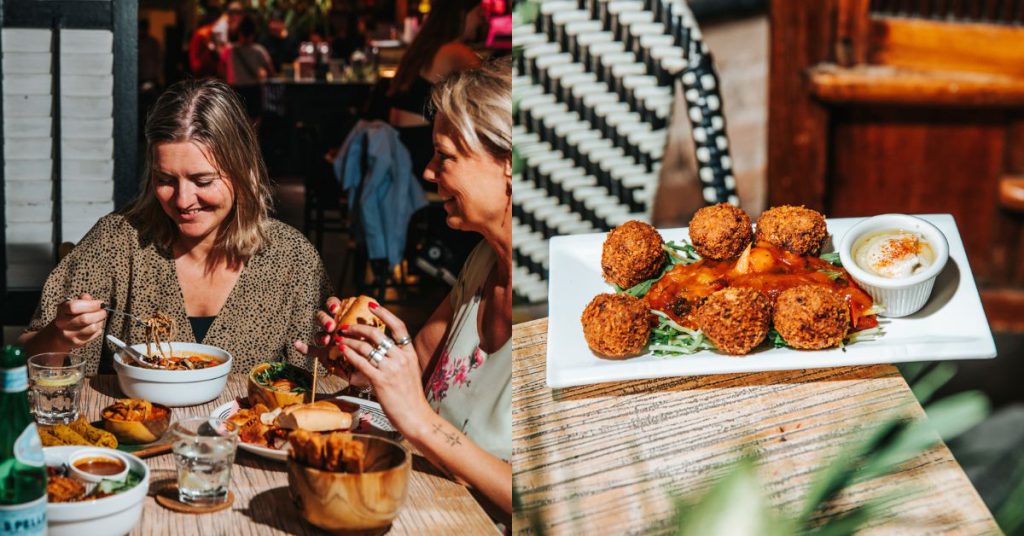
Although many of their neighbouring businesses shuttered, the family remained determined to keep their dream alive. With no financial aid available due to their newness, they pivoted to deliveries, building a small menu and handling orders themselves.
Word spread and their customer base grew, allowing them to gradually bring their staff back on rotation.
“Our location in Chinatown was a blessing in disguise. When restrictions were lifted, people were eager to explore their city again, and we became a hotspot. We were overwhelmed and understaffed, but incredibly grateful to have survived the first lockdown,” said Makissa.
LaGula: A sweet addition
As The Hungry Tapir flourished, the family expanded their offerings with LaGula by The Hungry Tapir, a vegan dessert bar located right next door.
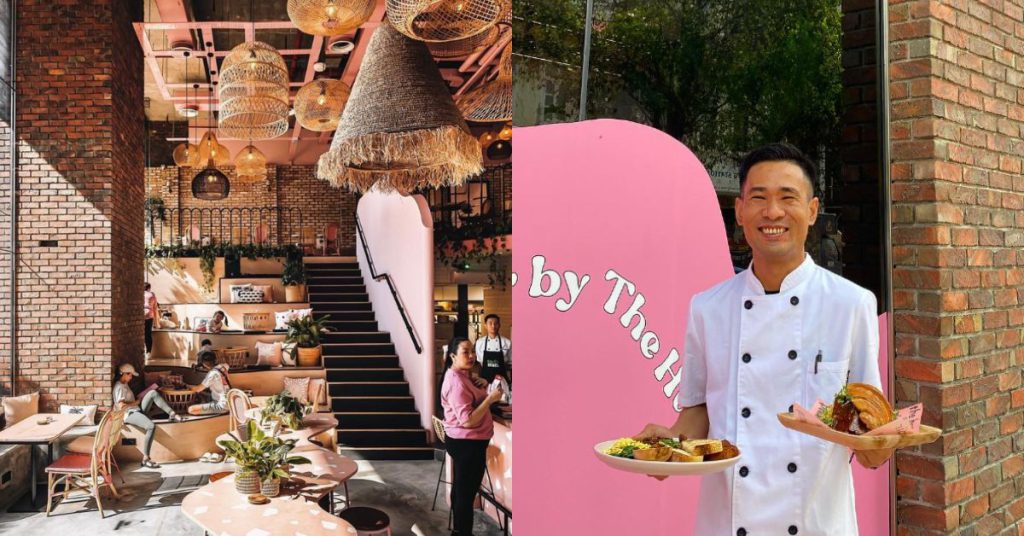
Like its sister restaurant, LaGula combines a love for food with creative flair, offering a range of plant-based sweets that are as visually appealing as they are delicious.
The expansion into desserts was a natural progression, given the growing interest in veganism and plant-based diets in KL. The family saw the opportunity to introduce something fresh to the market—a place where people could indulge guilt-free, knowing that everything on the menu was vegan.
“We wanted to create a space where even non-vegans would come, not because it’s vegan, but because it’s good. That’s the kind of response we’ve been getting, which is amazing.”
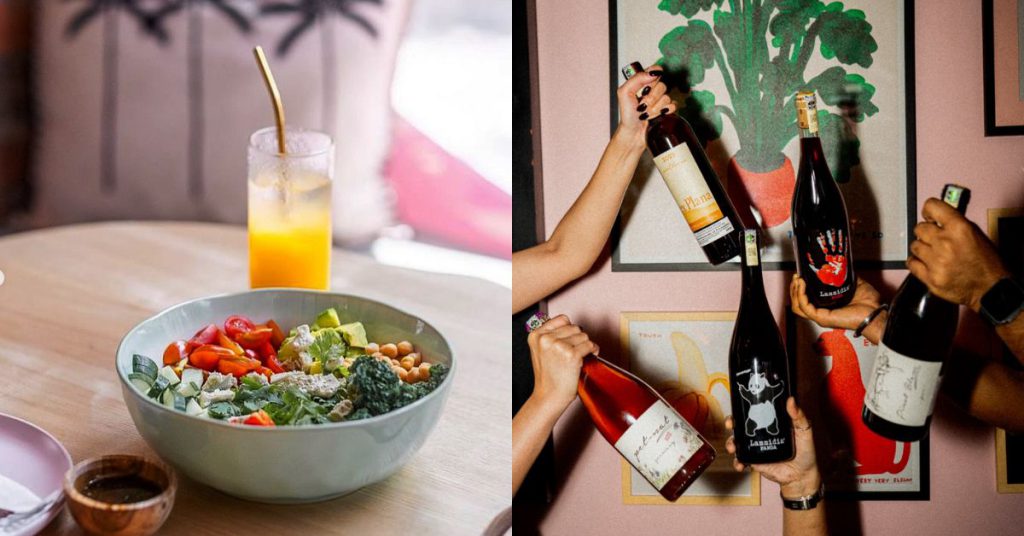
Interestingly, while one might assume the restaurant primarily caters to vegans, the reality is quite different.
“Our target audience isn’t just vegans. In fact, most of our customers are meat-eaters or tourists looking for something different. We wanted to create a space where people could enjoy great food without even thinking about it being vegan. It’s about the experience, the ambience, and of course, the flavours.”
A new wave of vegan eateries
Expansion is on the horizon, but they are treading carefully. “We’ve learnt so much from the challenges we faced, especially with COVID-19. We want to grow, but sustainably.”
There are plans to expand The Hungry Tapir and LaGula to other parts of KL and possibly beyond, but we’re taking it one step at a time,” she said.
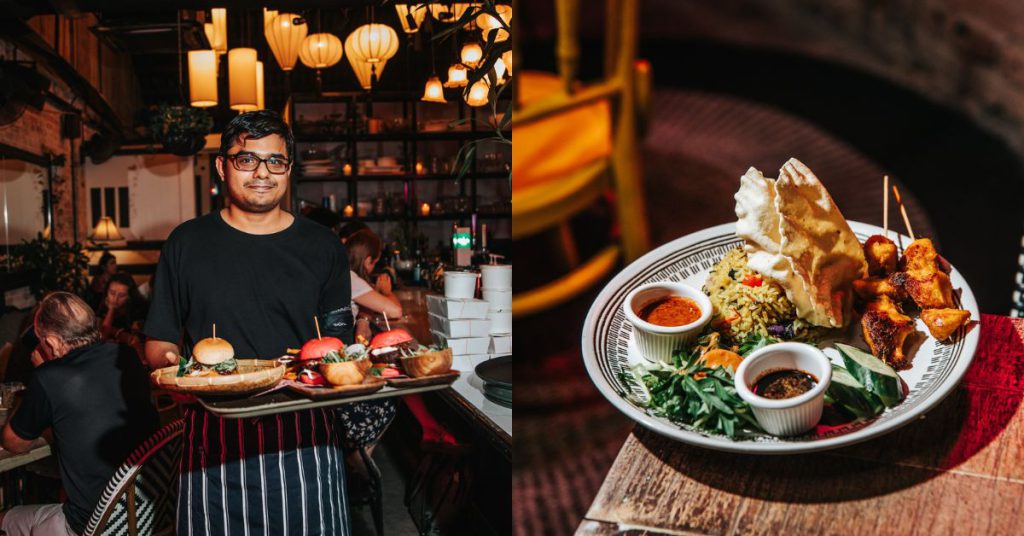
In addition to expanding the physical locations, the team is also looking into diversifying its offerings.
“We’re exploring more plant-based products, perhaps even venturing into packaged goods that can be sold in stores. The idea is to bring our unique flavours to a wider audience, whether they visit us in Chinatown or pick up something from their local supermarket.”
The rise of veganism in Malaysia, though still niche, is gaining momentum, and The Hungry Tapir and LaGula are proud to be at the forefront.
“In KL, it’s still niche to find a fully vegan restaurant, but that’s changing. More people are open to trying vegan food, even if they’re not vegan themselves. It’s exciting to see this shift and be part of it.”
“At the end of the day, we want people to come here, enjoy the food, and forget that it’s vegan. That’s when we know we’ve done something right,” Makissa summed up.
- You can learn more about The Hungry Tapir here and LaGula by The Hungry Tapir here.
- Read other articles we’ve written about Malaysian startups here.
Also Read: Asian Football Confederation launches 3 new leagues, sponsored by smartphone brand TECNO
Featured Image Credit: The Hungry Tapir
Little Caesars Pizza says ciao to Singapore, last outlet in Funan Mall closing in September

Little Caesars Pizza, the American pizza chain known for its value-for-money offerings, is closing its last remaining outlet in Singapore this September.
On September 3, the brand announced via their Facebook and Instagram pages that they would be closing their Funan Mall outlet.
The news comes after a series of gradual closures across the city-state, signalling the end of the brand’s presence in Singapore for now.
According to the article, Little Caesars has been steadily shutting down its outlets over the past few weeks, with the Ang Mo Kio and Northshore Plaza branches ceasing operations on August 13 and 26, respectively.
However, the final date for the Funan outlet’s closure has yet to be confirmed.
“A goodbye for now, Singapore!” the brand shared in its social media post. “Grab your large pizzas starting from S$11.90 while you can!”
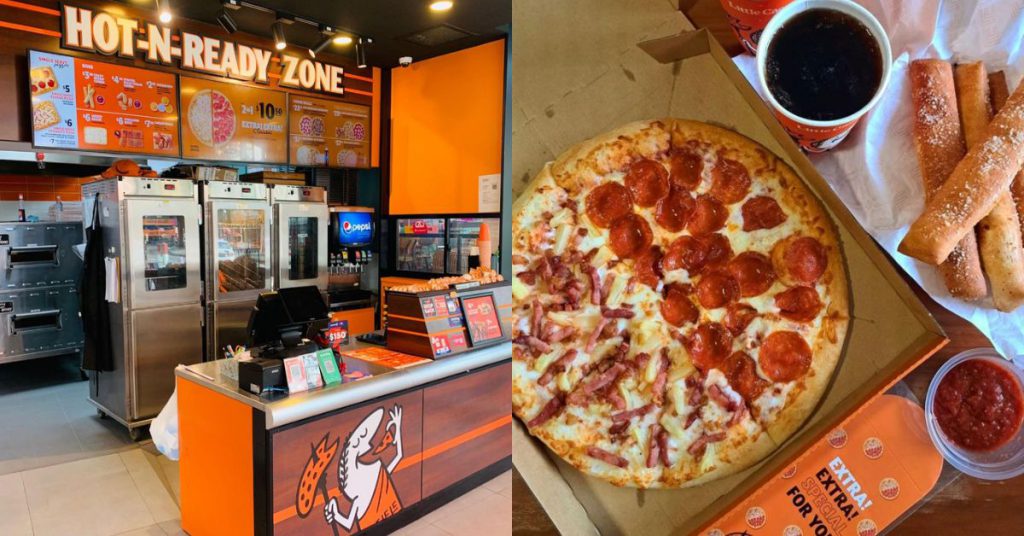
A decline foretold?
The closure of Little Caesars’ Funan outlet may come as a surprise to some, but for those who have been following the brand’s journey in Singapore, the writing has been on the wall for a while, according to Mothership’s article.
Since July 2023, six outlets in popular locations like Holland Village, Ang Mo Kio, Clementi, and Punggol have closed their doors, hinting at a broader exit strategy.
Little Caesars quickly became a household name for budget-conscious pizza lovers in Singapore. Their affordable large pizzas and quick service made them a go-to choice for families and students alike.
A short but memorable stay

Little Caesars has a long history dating back to its founding in 1959 as a family-owned restaurant in Michigan.
According to CNA, despite its global success, it only entered the Singapore market in 2018, opening its first outlet at Collyer Quay. The brand rapidly expanded, with stores popping up across the island in locations like Funan, SingPost Centre, and Junction Nine.
As the third-largest pizza chain in the world, Little Caesars has a presence in 26 countries and territories, with at least one outlet in every U.S. state.
However, despite its international acclaim, it seems that the brand faced challenges in sustaining its operations in Singapore.
Whether this is truly the end of Little Caesars in the city-state, only time will tell. But for now, it’s a goodbye—and hopefully not a permanent one.
- Learn more about Little Caesars Pizza here.
- Read other articles we’ve written about Singaporean startups here.
Also Read: After 4 yrs, this Melaka-founded private fitness brand is going global. First stop, Thailand.
Featured Image Credit: Little Caesars Pizza
Crypto firm OKX hires Grab’s ex-MD as its new CEO & gets payment licence from MAS

Cryptocurrency company OKX has officially received a major payment institution (MPI) licence from the Monetary Authority of Singapore (MAS) for its Singapore branch.
With this licence, OKX Singapore can engage in digital payment services, cross-border money transfers, and spot cryptocurrency trading for investors in Singapore.
This falls under the broader category of payment service provider licences under the Payment Services Act 2019.
With it, OKX can now legally conduct substantial payment activities in Singapore and joins the ranks of the few licensed crypto exchanges in Singapore. For context, OKX is one of the crypto sector’s largest global players.
This approval by MAS is a significant step forward for the nation’s growing digital asset sector and signals OKX’s strong focus here.
At the same time, the crypto exchange also announced the appointment of Gracie Lin as its new CEO in Singapore.
Tech In Asia reported that Gracie will be overseeing OKX Singapore’s strategic initiatives. This includes developing digital payment token products and services that meet the needs of local Singaporean customers.
Prior to joining OKX, Gracie was the Managing Director of Grab Singapore and had been in the company for close to six years. Her LinkedIn also states that she was with MAS for nearly a decade as the Deputy Director of its money markets department.
Safe to say, she’s qualified for this new role, backed by an illustrious career background.
The Straits Times also reported that following Gracie’s accession as CEO, the crypto company is looking to have more tokens. They’re in the midst of seeking the central bank’s approval to list more than 50 tokens that are currently available for trading on the platform.
Besides Singapore, OKX’s other international offices are located in Hong Kong, the UAE, and the Bahamas. Meanwhile, its cryptocurrency exchange is widely available to users worldwide, with restrictions in some jurisdictions.
- Learn more about OKX Singapore here.
- Read other articles we’ve written about Singaporean startups here.
Also Read: Think you have a winning company culture? Get awarded & recognised by TalentCorp Malaysia.
Featured Image Credit: OKX / Gracie Lin